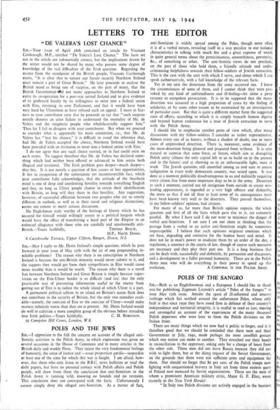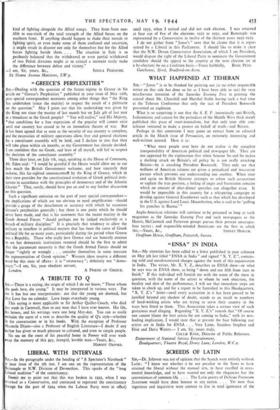POLES OF THE SANGRO
Sus,—Both as an Englishwoman and a Eutopean I should like to thank you for publishing Zygmunt Litynskrs article " Poles of the Sangro" in your May rzth issue. Amidst the spate of ill-informed and abusive verbiage which seethed around the unfortunate Poles, whose only fault is that since 1939 they have stood firm in defence of their country's independence and territorial integrity, it is restful to read so just, moving and unvengeful an account of the experiences of the many thousand Polish deportees who were later to form the Polish divisions on the Italian front.
There are many things which we now find it politic to forget, and it is therefore good that we should be reminded that these men and their Government in July, 1941, made perhaps the most unselfish gesture which one nation can make to another. They stretched out their bands in reconciliation to the oppressor, asking only for a change of heart from the other side. These men did not leave Russia, because they did not wish to fight there, but at the direct request of the Soviet Government, on the grounds that there were not sufficient arms and equipment for Si] them. Nor should we forget that So per cent of the Polish troops now fighting with unquestioned bravery in Italy are from those eastern parts Of Poland now menaced by Soviet expansionism. These are the men of whom a prominent American military critic, Major G. F. Eliot, wrote recently in the New York Herald: et "In Italy two Polish divisions are actively engaged in the heaviest kind of fighting alongside the Allied troops. They form from one- fifth to one-sixth of the total strength of the Allied forces on the southern front. If anything should happen to shake their morale or fighting spirit, or even make some of them confused and uncertain, it might result in disaster not only for themselves but for the Allied forces fighting beside them. . . . The situation in Italy is so perilously balanced that the withdrawal or even partial withdrawal of two Polish divisions might at so critical a moment easily make the difference between defeat and victory."
—I am, Sir, yours, &c., SHEILA PRIDMORE. B2 Sloane Avenue Mansions, S.W.3.



























 Previous page
Previous page